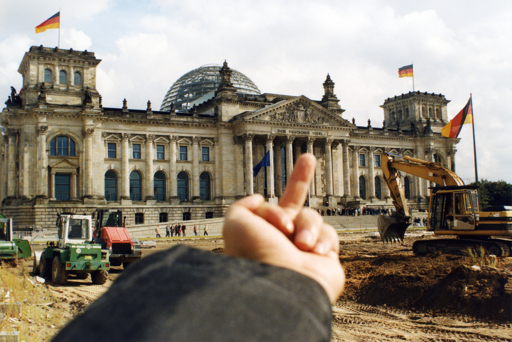if this was the article, i totally understand zeit.
ai wei wei is boring and prude. i never warmed up for his superficial art. basically jeff koons but with a selfrightous moral highground.
but i always thought he would offer something else. he is a well known human rights activist after all. then i read this lazy observation. maybe i thought there has to be more to the man than his art, he is worldwide known as a critic of nations and governments after all.
so i looked into his positions and “art”. the only word that sounded sincere was that he doesn’t understand art. the other stuff is a common ground, free from controversy. yes there is war and human rights are ignored, but ask yourself the following: if you asked chatgpt for it’s positions on human rights or an idea for controversial art - would the answer differ much from ai wei weis works?
When public events of great consequence — such as the Nord Stream Pipeline bombing — are met with silence from both government and media, the silence itself becomes more terrifying than any atomic bomb.
It is interesting how people remember things differently - I really do not think that there was silence from the public or government in regards of the Nord Stream bombings. Yes, there weren’t any demonstrations or riots on the street, but silence?
Well, silence is not the correct word, I agree. But the reaction was kind of mild, when you think about that it was a terrorist attack on seemingly very important infrastructure and thus on Germany’s sovereignity. And that holds especially true after it became clear that it wasn’t the Russians but someone who wanted to influence Germany’s stance on Russia’s invasion. Nobody cared.
I mean, Germany is obviously not in the position, but the US basically devastates whole regions for less. Thus it can be argued, that the reaction was comparably “silent”.
It still is quite strange for him to focus on Nord Stream. Yeah, it was important infrastructure. But it was switched off for quite a while due to sanctions against russia before the attack. So not great, but there was no immediate impact for people.
I could understand if he was focussing on silence in regard of the Ukraine war or even Gaza, but Nord Stream is strange
I think he took it as an example, because it was basically an direct attack on Germany. So the example is crass, as in “if it doesn’t fit into the mainstream story, we even ‘ignore’ direct attacks”.
While the silence on the Gaza genocide holds just as true, it is not a direct attack and thus not such a strong example for the point.
How should Germany have reacted? As I see it there were two possible culprits: Russia or Ukraine. If we make a big deal out of it we have to act.
-
Say it turns out to be Russia, then we have a direct attack on the infrastructure of a NATO member. If we don’t react to that it sends a desastrous message. If we do we and the rest of NATO have to react with force, something everyone has tried to avoid at all cost so far.
-
If links to Ukraine turn out to be true (which seems more likely atm) this will give a massive boost to anti Ukrainian sentiment, with a good chance of complete collapse of public support for Ukraine. So what are we supposed to do then? Considering how Germany got bashed by everyone already for seemingly not doing enough (unfairly imo).
Now even getting into a position like that is the result of long-term strategic failure. But in my limited view keeping this topic comparatively small is a favor to everyone involved. Because in the end world goes on without the pipeline as well.
What you describe is exactly the point Ai WeiWei is trying to make in that paragraph: you let something as severe as an blatant attack just slide, because it does not fit in your strategic planning.
And that is the hypocrisy he is calling out: the reaction would have been different if it was an enemy state like Russia or Iran but “silent” when it was Ukraine or Israel for example. Take that “it is not okay to spy on friends” bullshit as another example. Like spying for Russia or China is uncovered and the perpetrators prosecuted (which is obviously a good thing), but nobody ever did something about the large scale spying by our allies.
There is obviously nothing new about it, except that in our age those hypocrisies are more easily uncovered. And that leads to frustration, when it becomes clear, that it is never about the act itself but about who is the actor. That holds true on geopolitical issues like that, but also, as pointed out, for
- When Israel genocides it is okay (and Germany even supplies weapons), when China does it it’s not
- When the US attacks or threatens another country it is okay (and Germany even might help), when Russia does it it’s not
- When rich people commit crimes it’s okay, when poor people do it it’s not
- and many more
And the cherry on top is, that nobody openly tells the truth as “yeah, obviously all of that is different for our allies than for our enemies, because it is in our strategic interest”, but always hides behind some “values”, like “it’s about international law or human rights”. No, if it were, we had to do something about that stuff equally.
-
Since I don’t speak the language, I can only imagine that the young people coming to Berlin would talk about […]
Pretty brave presenting a list of pretty harsh statements without explanations about the German state and its people when not even understanding what they are actually talking…
Not really surprised that Zeit stepped back from publishing the article.
I like it. His art, words, challenge and provoke. I especially love the context here of asking a question when you are really not prepared for the answer.
It is perfect and should have gone to publication. Seeing this piece surrounded by lighthearted fluff about mustards would have been even more delicious.
Thought the same, found the article to be pretty dull and shallow. No notable insights shared.
That’s basically every westerner passing judgement about China, so I’ll take it that his artistic message punched through
When people sense that power is beyond challenge, they redirect their energy into trivial disputes. And those trivialities, collectively, are enough to erode a society’s very foundations of justice.
This is more true than usual in more places than just Germany.
Exactly. As I stated in another comment already, most of the statements feel like generic Fortune-Cookie-style wisdom packed into edgy language.
If half the world is failing in precisely the same ways at this time, it’s all the more valuable to publish the words of an artist who’s able to point it out.
But what does he actually point out?
Most of the statements are so ambiguous, generic and, quite frankly, mundane that they are almost free of deeper meaning.
And the last third is just whining about how nobody appreciates the “worthy” (meaning: his?) art any more.
Pathetic.Without having read the article yet, I expect that a Chinese person would never state criticism bluntly. Being ambiguous to make it possible to dismiss it is to be expected.
Thank you. A bad instinct is “why are you picking on me!”. A good instinct is “this is a useful case study for all to learn from!”.
The whole article consists of such truisms.
Immigrant refuses to learn the language of the country he moved to and goes on to feel unwelcome. What a shame. As an immigrant living in Germany myself I’d recommend he go somewhere else.
Seems reasonalble? I don’t agree with everything, but he is not exactly wrong with his impression. And yes, Chinese restaurants in Germany suck 🤷
To stay with the Chinese restaurant trope:
Many of his statements seem to me to be generic Fortune Cookie level wisdom.
Generally not wrong, but also of limited specific reference to Germany.Some are true but generally known. We would like to find a solutions ourselves to them. e.g. the excessive and often uncompromising bureaucracy.
And some statements are so ambiguous that they are ready to be used by the very enemies of democracy and freedom for their own purposes.
Right out of the AfD style book.And some statements are so ambiguous that they are ready to be used by the very enemies of democracy and freedom for their own purposes.
He called you out already: “When conversation becomes avoidance, when topics must not be mentioned, we are already living under the quiet logic of authoritarianism.”
Funny that you used that specific quote, as this was the exact one I was specifically thinking about when writing my statement.
Postulation of non-existant “Denkverbote” is a prime AfD narrative.And because they are using it, you are saying that we should not talk about how some topics are becoming more and more taboo. You are making a meta-taboo, and that’s self defeating.
I’m not talking about some silly/dangerous “debate the fascists on the topics they choose” strategy of course. We don’t debate fascists, period.
I’m talking about the fact that the fascists always use a kernel of truth to spin their house of lies from. And that kernel of truth is that indeed the liberal mainstream doesn’t talk about certain things, with the brain-dead German mainstream consensus on denying the Gaza Genocide being a prime case study.
And because they are using it, you are saying that we should not talk about how some topics are becoming more and more taboo.
That’s not what I said.
Please do so, point out topics that are not covered enough, but be specific and not so ambiguous as Ai Weiwei here.
Otherwise nefarious people will use the statements to push their own agenda.
Otherwise nefarious people will use the statements to push their own agenda.
Yes, and the presence (or absence) of said ambiguity is exactly what makes or breaks a good article imo. Because all information has a "goal rationale " ( as in Zweckrationalität, Max Weber).
you are saying that we should not talk about how some topics are becoming more and more taboo.
They did not say that.
This rings so much for nordic countries too.







